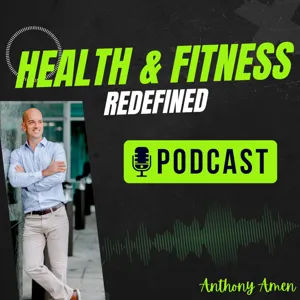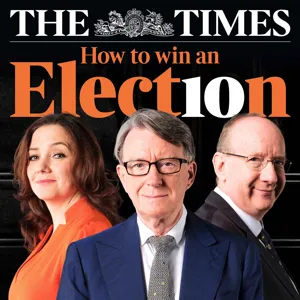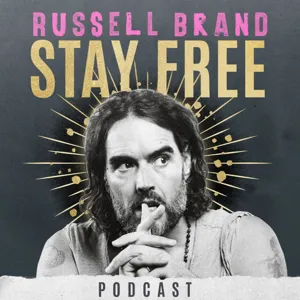Podcast Summary
Businesses prioritize customers with quality and convenience: Burrow offers modular, durable seating with easy assembly, fast free shipping, and a Memorial Day sale. Blue Nile provides a wide jewelry selection, fast shipping, and free returns for Mother's Day gifts.
Both Burrow Furniture and Blue Nile prioritize their customers, offering high-quality products and convenient services. Burrow's modular and durable seating comes with easy assembly, disassembly, and fast free shipping, while their Memorial Day sale offers significant discounts. Blue Nile provides a wide selection of stunning jewelry, fast shipping options, and free returns for Mother's Day gifts. Meanwhile, in the news, Dr. Natalie McDermott from King's College London updated us on the rapidly changing situation with the COVID-19 outbreak. The number of cases and deaths in China saw a significant increase due to a change in the case definition for confirmed COVID-19 cases in Hubei province and Wuhan. This revision led to a substantial increase in reported figures, adding to the uncertainty surrounding the spread of the virus. The situation remains fluid, and we continue to monitor the developments closely. In essence, businesses like Burrow and Blue Nile focus on providing value to their customers, while the COVID-19 situation continues to evolve with new information and challenges.
Concerns over accuracy of COVID-19 data in China: Changes in reporting methods and time lag between infection and death may impact COVID-19 data accuracy in China, potentially affecting response strategies.
The reliability of the reported data on COVID-19 cases and deaths in China has been a source of confusion, with concerns raised about potential inaccuracies due to changes in reporting methods and a time lag between infection and death. Dr. McDermott, who was interviewed on the matter, suggested that the large drops and increases in daily reported cases could be due to various reasons, including changes in testing capacity and case definition. Ian, a listener, added to the discussion by pointing out that the reported death rate of 2% for COVID-19 might be a false statistic due to a time lag between infection and death. According to Ian's analysis, the real death rate could be somewhere between 6% and 18%. These concerns highlight the importance of transparent and accurate reporting of data during public health crises to inform effective response strategies.
Mortality rate of COVID-19 can be lower than initially calculated: The overall mortality rate for COVID-19 is estimated to be around 1% when accounting for mild cases that go unreported.
The estimated death rate for COVID-19 can be significantly lower than initially calculated if we account for mild cases that go unreported. The speaker explained that Ian's calculation is correct in principle, but in practice, the spreadsheet doesn't include all cases. The mortality rate for hospitalized patients in Wuhan is around 18%, but when accounting for mild cases that are never tested, the overall mortality rate is estimated to be around 1%. However, this unknown entity of mild cases is a challenge in determining the exact mortality rate. It's important to note that we are not yet in a pandemic stage, as significant outbreaks have not occurred consistently on all continents.
COVID-19's unique characteristics make it a significant public health threat: Despite a lower mortality rate, COVID-19's ease of transmission during the incubation period and potential for widespread transmission increase the likelihood of more total deaths compared to past outbreaks like SARS and MERS.
COVID-19 is more concerning than past outbreaks like SARS and MERS due to its ease of transmission during the incubation period when people may not yet be showing symptoms. This makes it harder to contain and could lead to a larger number of total deaths, even though the mortality rate is lower than those past outbreaks. The speaker also noted that SARS was more deadly but less contagious, while bird flu is less contagious but more deadly. With COVID-19, both the mortality rate and ease of transmission are causes for concern, making it a significant public health threat. The ongoing localized transmission in Singapore and potential spread to other continents increases the likelihood that it will be classified as a pandemic. Overall, the speaker emphasized the importance of taking measures to prevent the spread of COVID-19 due to its unique characteristics compared to past outbreaks.
Following public health guidelines protects vulnerable individuals and slows down the spread of COVID-19: Individual actions like washing hands, staying home when sick, and avoiding public transport when ill, along with collective efforts, can help protect vulnerable individuals and slow down the spread of COVID-19, making a significant difference in controlling its impact.
While the COVID-19 virus is contagious and has a case fatality rate around 1%, it's essential to take individual and collective actions to prevent its spread. Dr. Natalie McDermott from King's College London emphasized the importance of following public health guidelines, such as washing hands, staying home when feeling unwell, and avoiding public transport when sick. These actions help protect vulnerable individuals in the population and slow down the spread of the virus. The uncertainty surrounding the case fatality rate underscores the need for continued efforts to develop treatments and vaccines. In summary, taking preventative measures seriously and working together can make a significant difference in controlling the virus's impact.
Exploring Flexible Health Insurance Options with UnitedHealthcare: UnitedHealthcare Insurance Plans offer flexibility for various life situations, including job transitions, self-employment, and missed open enrollment periods. Visit uhone.com to explore these options and find a plan that fits your unique needs.
UnitedHealthcare Insurance Plans offer flexibility for various life situations. These plans can be suitable if you're currently between jobs, transitioning off your parents' plan, turning a side hustle into a full-time business, or even missed the open enrollment period. By visiting uhone.com, you can explore these options further and find a plan that fits your unique needs. These plans offer the convenience and peace of mind that comes with having health insurance coverage, even during life's unexpected twists and turns. So, if you're looking for flexibility and reliable health insurance, consider exploring UnitedHealthcare Insurance Plans.






